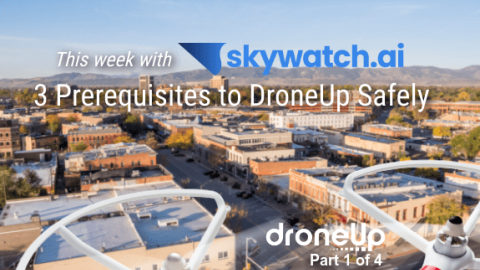Are you starting a commercial drone operation? Maybe you have already jumped in, but are scratching your head wondering not only how you’re going to make this drone operation profitable, but safe? And, what do you do to cover yourself should you have an incident?
This week, DroneUp and SkyWatch.AI are coming together to bring you more information on where to start, how to remain incident free, and what you need to consider when insuring your drone flights when not insured by your pilot network.
Let’s start at the beginning. Before you can profess expertise and sign-up for liability coverage, you need to ask yourself three questions that directly relate to your operations safe business practices: How do you educate yourself? What test(s) are required to become a verified commercial drone pilot? And, what training is needed for your business plan?
Three prerequisites to go drone up: Education, Testing, & Training.
Education
Before you buy. Educate yourself.
Not only will you need to understand what type of drone you need, but you will also need to know the specifics of photography and cinematography, moreover you will need to learn how to fly a drone and understand the rules and regulations of flying that drone in National Airspace (NAS). There is considerable value in your endeavor. Understanding it from the beginning will create a safe, start-up environment to ensure risk mitigation.
Let’s start with some basic questions:
- What are you using your drone for? Cinematography? Inspection? Mapping? Thermal Imagery?
- What vertical market would you enjoy investing your time and energy to service?
- Do you have a pre-built network in agriculture, construction, real estate, insurance, utilities, public safety, or inspection to pursue?
- What is the best drone and equipment for your target market?
- What training will you need to earn the jobs you want to get?
If you are capturing photos and images for special events, your business plan will be different than that of the drone operator doing roof inspections or agriculture plant health analysis. Define your niche or target market from the get-go and research information about that market. It will save you time and money. You can tweak your business plan down the road, but decide to start with a focus.
- What software will you need?
- What apps will you use?
- What assets and essentials will the jobs require of you? Check out 5 Drone Essentials For Beginners.
- What credentials will you need?
- What waivers will be required?
- What skills will require proficiency to earn the jobs you want to fly?
- Do you need to register your drone?
- Does your drone require maintenance?
- Do you need to insure your drone? Yourself?
Testing
Many drone operators start by buying a drone to fly for fun. But, to fly for-hire, you must obtain a Part 107 Remote Pilot Certificate by passing the FAA Part 107 test. In addition to the initial test, you will also need to take a recurrent (or renewal) test every 24 months to show the FAA you remain proficient. Understanding the difference between the initial test and the recurrent test will save you time too.
Training
In addition to testing, you can seek training, not only to learn how to fly a drone but to also understand the vocabulary, requirements, and logistics of becoming a remote pilot operator. For instance, you will need to understand what a Certificate of Authorization (COA) is and how these function for your business. What’s more, you may want to use waivers to expand the scope of your job capabilities. For example, flying Beyond Visual Line of Sight (BVLOS); this is a waiver you may want to consider for your drone operation. It will become critical to understand your responsibility to the FAA, and state and local rules and regulations. There are many drone training providers who sell their knowledge and training, and there are also many free resources. Immerse yourself in the drone industry and listen to the buzz. Join forums, social media groups, attend meet-ups, follow professional drone organizations and industry leaders, sign-up for newsletters and download and evaluate apps.
A safe drone operation starts with education, training, testing, and vigilance. Understanding how to operate and following the ever-evolving regulations is paramount to safe drone practices. And, to safely integrate your drone operation on to the public stage for-hire, you must consider risk management and insuring coverage if an incident occurs.
Over the next three days, DroneUp & SkyWatch.AI will provide additional information on how to mitigate risk past your initial education and training.
Visit tomorrow at 2 PM for SkyWatch.AI’s, “Where to Begin” when looking into drone insurance.
